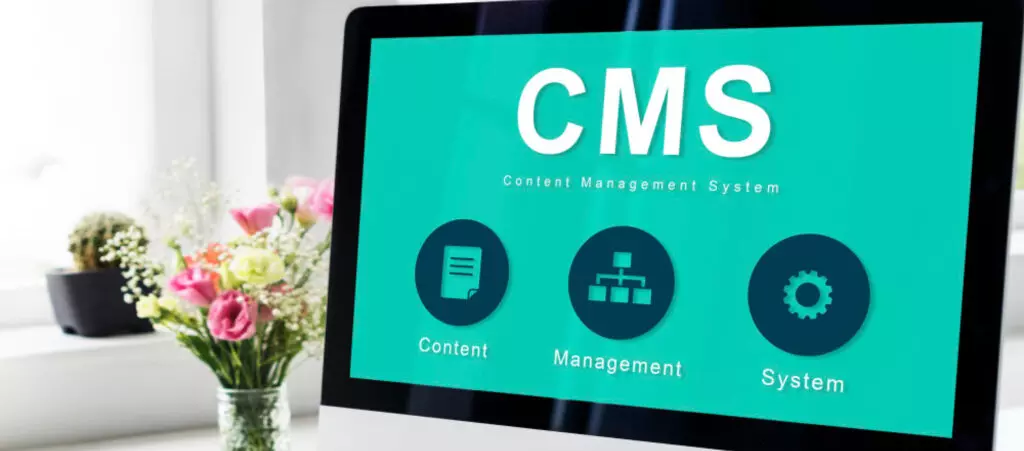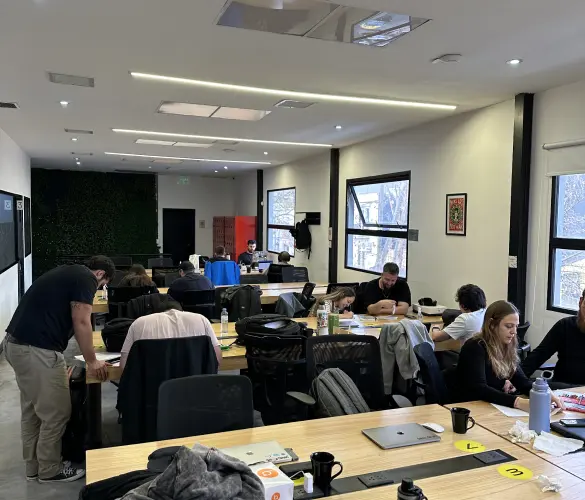Is WordPress the best CMS for 2024?

Is WordPress the best CMS for 2024? For some, it is. For many others, WordPress is still stuck in 2003, when it was used primarily as a blogging platform. However, the platform has evolved over 20 years to become a flexible, customizable, and mature CMS with the tools to build any website.
This article explores how WordPress went from a blogging platform to the most popular CMS in the world and why it powers over 40% of the internet, by far the largest share in the CMS market.
From blogging platform to mature CMS

WordPress was first released in 2003 by co-founders Matt Mullenweg and Mike Little. It started as a fork of an existing blogging platform called b2/cafelog. It was initially designed as a blogging platform, focusing on user-friendliness.
WordPress’s popularity rose between 2005 and 2010, becoming the preferred blogging platform. The 2010s is when WordPress started truly expanding into CMS territory by releasing custom post types and taxonomies, among other functions. Over time, it evolved into a more versatile CMS with a rich content editor, theme customization, and a massive library of themes and plugins to explore.
One of the keys to success was its open-source nature, which allowed developers to contribute to the platform. It made WordPress a highly customizable platform where users can create unique websites with or without code.
Today, WordPress is still maintained by a team of dedicated developers and continues to evolve with new features and improvements. It’s still used for blogging but also to build any other type of site, from media giants to small, medium, and large-sized eCommerce marketplaces.
9 reasons to use WordPress in 2024.
WordPress gives you plenty of reasons to choose from if you’re exploring CMSs to learn as a web developer or to power your business website.
It’s beginner-friendly

WordPress is considered one of the most user and beginner-friendly CMSs in the market, if not the most. Anyone with basic computer skills can create a website with the platform’s built-in tools. That said, only trained developers who know how to code in HTML, CSS, JavaScript, PHP, and MySQL can exploit WordPress’s flexibility and scalability potential.
Still, anyone can learn to use WordPress and enjoy its user-friendliness, exemplified by the following features:
- Friendly UI. WordPress is easy to use and navigate, with a clean interface that doesn’t require coding by default.
- It’s easy to install. Depending on your host, you can install WordPress in a few clicks.
- A large community. WordPress’s largest CMS-specific developer community provides beginners with many learning resources. You’ll find endless free tutorials, guides, forums, and support groups to help you understand how WordPress works.
- Thousands of plugins. WordPress has a vast plugin library to extend your site’s functionality. Plugins save the time you’d have spent coding to add features like contact forms, galleries, and social media integration.
It has a diverse theme and plugin ecosystem.
As of this article’s writing, WordPress has nearly 11,000 free and premium themes and over 60,000 free and premium plugins. With such a large variety of options, there’s bound to be a combination of themes and plugins that fits your needs.
It’s free and open source.
Being free, WordPress is immediately cost-effective. That doesn’t mean you won’t spend any money, though. However, if you have a large website that moves massive monthly traffic and requires multiple paid plugins and special server infrastructure, you can power your website with less than $100 per year. Your only expense will be web hosting and domain name maintenance.
The benefits of being open-source include the following:
- Security. With such a large community, WordPress plugins, themes, and core files receive frequent security patches to counteract known vulnerabilities.
- No licensing fees. It is a cost-effective option for individuals, small businesses, and nonprofits.
- Support. WordPress’ large developer community provides all the resources you need to use the platform effectively.
It’s very flexible and customizable.

Being open-source, WordPress allows a great deal of flexibility and customization. For example, you can extend or modify the core code to create custom plugins, themes, and functionalities that cater to specific needs (in addition to installing the ones already available).
It means you can create high-performing and feature-rich websites by modifying the existing structures to fit your needs, leading to tailored solutions limited only by skills and imagination.
It has a large developer and development agency community
You will always have options if you decide to build a WordPress website for your business. From freelance developers to agencies with dozens of seasoned developers at their disposal, the WordPress developer community has everything you need to create a website that fits your business needs, whether simple or complex.
Its core is very secure.
The WordPress core files (those that constitute WordPress software itself) have a strong security record, and the core is generally considered very safe. The WordPress core files are developed by a team led by its co-creator, Matt Mullenweg. Five other lead developers and more than a dozen core developers have permanent commit access. Finally, there are dozens of contributors.
Everyone in the WordPress core development team earned their place by commanding respect through their past work. They’re some of the most qualified security professionals in the world, releasing frequent security patches to keep the community safe.
It has multisite support.

The WordPress Multisite feature is a feature that allows you to create a network of multiple websites, all running on a single WordPress installation. This feature provides several benefits, including the following:
- Cost-effectiveness. You don’t have to pay for individual hosting plans. All sites in the network are associated with the same plan.
- Centralized management. You can manage all websites in the network from the same dashboard, including plugins, themes, and user accounts. No need to manage multiple installations and
- Consistent branding. Using the same themes and plugins, you can maintain consistent branding across the network.
- Simultaneous updates. You can update all your websites at once.
- Shared content. You can share content like blog posts to multiple sites at once. It is great if you have a shared calendar of events or frequently need to publish network-wide alerts and notices.
- Shared licenses. All premium plugins and themes you acquire can be used on all sites in the network under the same license.
It has eCommerce support.
WordPress wasn’t built for eCommerce support but is flexible enough to provide the tools developers need to build an eCommerce marketplace. Some of the benefits of WordPress as an eCommerce platform are the following:
- Multiple eCommerce plugins. There are various alternatives for WordPress eCommerce development, with WooCommerce being the most popular and best-regarded one. These plugins are designed to be easy to use and very SEO-friendly.
- No commissions to WordPress. Unlike dedicated eCommerce platforms like Shopify, the WordPress organization charges no commission per sale when you use it to build your eCommerce site. Transactions may still be subject to commission from payment processors like Stripe or PayPal.
- All the flexibility and customizability of WordPress. Dedicated eCommerce platforms are more limited in scope since they only need to worry about eCommerce functionality. But as we know, WordPress has no such limitations and provides ample room for customization and flexibility.
It has built-in SEO features.
WordPress is built with SEO in mind, enjoying features like clean code, customizable permalinks, fast loading speeds, responsive design, Google Analytics integration, image optimization, and many SEO-focused plugins like Yoast SEO.
Of course, it’s up to developers to express this SEO-friendliness. Still, they have all the necessary tools to make it happen.
Is WordPress the best CMS for your website?
Determining whether WordPress is suitable for your website depends on your specific needs. In general, WordPress provides the tools to create any website, so it’s really hard to go wrong with it.
On the other hand, other CMSs may have specific features that greatly benefit your website. It’s essential to explore your needs and determine whether WordPress fulfills them. Which, again, most of the time, it will. For a deeper comparison with the closest competitor in the CMS market, read our comparison with Drupal.
From a developer’s perspective, learning WordPress is an excellent way to gain a foothold in a growing industry and secure long-term employment due to how many businesses decide to build their websites on WordPress.
Overall, WordPress is a mature CMS that provides the tools to create any website, and its overwhelming popularity is a testament to its dominance in the CMS market.
Related Articles

Business / 12 min read
Business / 12 min read
How to Take on More WordPress Development Projects While Maintaining Quality
As a digital agency that provides WordPress services, your job is to take on as many projects as possible while maintaining the highest quality. This is easier said than done…
Read More
Business / 9 min read
Business / 9 min read
How to Choose a WordPress Development Agency to Scale Your Projects?
When your agency starts to scale, you may decide that a big part of your expansion will be providing WordPress services. If that's the case but you don't have an…
Read More
Business / 7 min read
Business / 7 min read
How to Optimize Time and Resources in WordPress Projects
WordPress agencies need to optimize and human resources use in order for their services (development, QA, design, etc.) to be profitable. They need to plan these projects very thoroughly to…
Read More
Business / 11 min read
Business / 11 min read
How WordPress Outsourcing Can Help Scale Your Agency
WordPress development outsourcing is becoming more frequent and affordable every day, helping global digital agencies of all sizes scale their services without the long-term investment of hiring an in-house team.…
Read More
Business / 8 min read
Business / 8 min read
What Is a White Label WordPress Development Agency?
A white label WordPress development agency is a company of WordPress developers, QA analysts, and project managers who provide outsourced services to digital agencies that lack a development team. Importantly,…
Read More